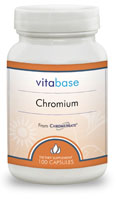| |
Chromium supplements |
|
Chromium is a naturally occurring mineral trace mineral in human nutrition. Trivalent chromium is an essential trace metal and is required for the proper metabolism of sugar in humans. Unlike other essential trace metals, chromium has not been found in a metalloprotein with biological activity. Chromium is a metal with atomic number 24 and an atomic mass of 52 daltons. It receives its name from the green, orange, yellow, and red colors which emanate from the oxide and acid which contacts specific minerals and yields a chrome-green, chrome-yellow, and other color pigments.
|
| |
Biological functions and health benefits of chromium |
|
|
Chromium is important in the metabolism of fats and carbohydrates. Chromium helps moves blood sugar (glucose) from the bloodstream into the cells to be used as energy and turn fats, carbohydrates, and proteins into energy. Chromium stimulates fatty acid and cholesterol synthesis, which are important for brain function and other body processes. It is an activator of several enzymes, which are needed to drive numerous chemical reactions necessary to life. Chromium supplementation also improves glucose tolerance in people with Turner's syndrome, a disease linked with glucose intolerance. Chromium is also important in insulin metabolism. Insulin is an important hormone for controlling blood sugar levels as well as for metabolising fats and proteins in the body. Chromium may decrease the amount of insulin resistance present and thus it may change the type or amount of medication needed to treat the diabetes. It may help them control their blood sugar and may play a role in the development of adult-onset diabetes. Chromium, in a form called chromium picolinate, may improve symptoms of depression in people with atypical depression. Chromium, in combination with copper, may have potential suppressive effects on immune function. |
| |
Dietary sources of chromium |
|
| Food sources of chromium include processed meats, whole grain products, cereals, spices (black pepper, thyme), mushrooms, brown sugar, coffee, tea, beer, broccoli, and spices. Brewer's yeast is also a good source of chromium. The best source of chromium is brewer's yeast, but many people do not use brewer's yeast because it causes abdominal distention (a bloated feeling) and nausea. Vegetables, fruits, and most refined and processed foods contain low amounts of chromium. Chromium supplements are available in several forms: chromium chloride, chromium nicotinate, chromium picolinate, and high-chromium yeast. |
| |
Dosage, intake, recommended daily allowance (RDA) |
|
There are no recommended dietary allowances for chromium. The amount of chromium needed to meet normal daily recommended intakes will be different for different individuals. According to the Food and Nutrition Board of the Institute of Medicine, the safe and adequate daily intakes of chromium are as follows:
Infants birth to 6 months: 0.2 mcg
Infants 7 to 12 months: 5.5 mcg
Children 1 to 3 years: 11 mcg
Children 4 to 8 years: 15 mcg
Boys 9 to 13 years: 25 mcg
Teenage boys 14 to 18 years: 35 mcg
Girls 9 to 13 years: 21 mcg
Teenage girls 14 to 18 years: 24 mcg
Adult males, 19 to 50 years: 35 mcg
Adult males, older than 50: 30 mcg
Adult females, 19 to 50 years: 25 mcg
Adult females, older than 50: 20 mcg
Pregnant women: 29 to 30 mcg
Lactating women: 44 to 45 mcg
|
| |
Chromium deficiency symptoms |
|
Chromium deficiencies can affect the potency of insulin in regulating sugar balance. Chromium deficiency may be seen as impaired glucose tolerance. It is seen in older people with type 2 diabetes and in infants with protein-calorie malnutrition. Chromium deficiency is characterized by insulin resistance, hyperglycemia and lipid abnormalities. Low chromium levels may cause high cholesterol and a greater risk of developing coronary artery disease (CAD). Severe chromium deficiency may cause weight loss, poor coordination, destruction of the nerves in the extremities of the body (peripheral neuropathy) and inflammation of the brain. |
| |
Side effects, precautions, drug interactions |
|
No side effects have been reported for chromium. Chromium administered parenterally in high doses may cause skin irritation. Because of the low absorption and high excretion rates of chromium, toxicity is not common. Chromium supplementation may enhance the effects of drugs for diabetes and possibly lead to hypoglycemia. |
|
|
|
|
 Chromium is at the heart of a biologically active complex called Glucose Tolerance Factor or "GTF," which is responsible for increasing the action of insulin in the body. This formulation uses ChromeMate, a patented oxygen-coordinated niacin-bound chromium complex. Combined with exercise and a sensible diet, ChromeMate helps maintain healthy body weight and promotes normal energy metabolism, maintain healthy cholesterol levels and promotes cardiovascular health, and promote normal insulin function and maintains healthy blood sugar levels. Click here for more information.
Chromium is at the heart of a biologically active complex called Glucose Tolerance Factor or "GTF," which is responsible for increasing the action of insulin in the body. This formulation uses ChromeMate, a patented oxygen-coordinated niacin-bound chromium complex. Combined with exercise and a sensible diet, ChromeMate helps maintain healthy body weight and promotes normal energy metabolism, maintain healthy cholesterol levels and promotes cardiovascular health, and promote normal insulin function and maintains healthy blood sugar levels. Click here for more information.